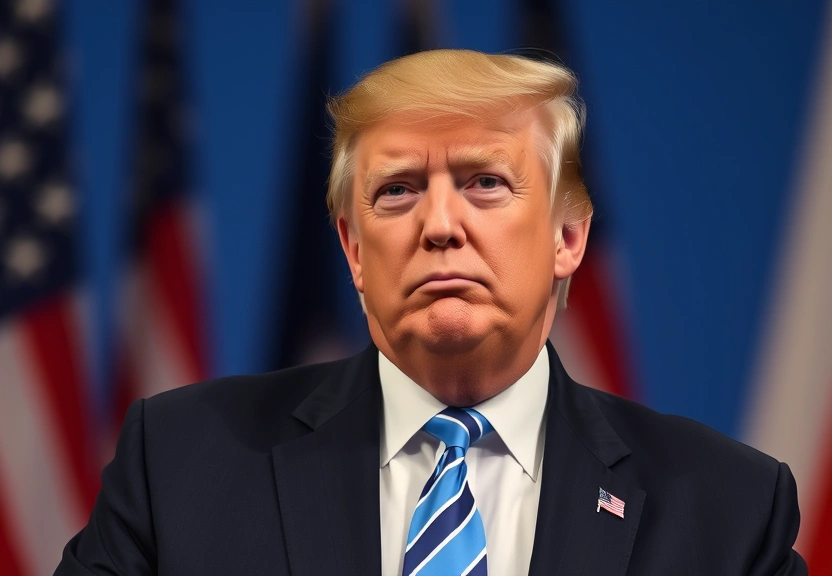Trump’s Trade War Heats Up: Why Investors Are Staying Calm for Now
On Tuesday, President Donald Trump reiterated his commitment to imposing new tariffs set to take effect on August 1, a move that has reignited concerns over the ongoing trade war with China and its potential ramifications on the global economy. However, despite these escalating tensions, Wall Street appears to be taking a more measured approach, showing signs of resilience in the face of uncertainty. Investors are weighing the implications of Trump’s actions against broader economic indicators and the current market climate.

In this article, we will explore the current state of Trump’s trade war, the reactions from Wall Street, and why investors remain largely calm despite the looming threat of increased tariffs. By examining the potential impacts on various sectors and the global economy, we aim to provide a comprehensive overview of the situation and its implications for investors.
The Current Landscape of Trump’s Trade War
The trade war between the United States and China has been a defining feature of Trump’s presidency. Initiated in 2018, the conflict has seen both nations impose tariffs on each other’s goods in a tit-for-tat strategy aimed at protecting domestic industries. As of now, the United States has placed tariffs on hundreds of billions of dollars’ worth of Chinese products, while China has retaliated with its own set of tariffs.
Trump’s latest announcement of a deadline for new tariffs has raised questions about the future of trade relations between the two countries. The August 1 deadline is particularly significant as it comes at a time when both economies are trying to recover from the effects of the COVID-19 pandemic. Investors are concerned about the potential for increased costs on imported goods, which could translate into higher prices for consumers and ultimately slow economic growth.
Wall Street’s Response: A Calm Amidst the Storm
Despite the heightened rhetoric and the potential for escalating tariffs, Wall Street has shown a surprising degree of stability. Stocks have fluctuated but have not experienced the dramatic downturns that many analysts anticipated. This resilience can be attributed to several key factors.
Understanding Market Sentiment
Many investors are adopting a “wait and see” approach, believing that the trade war is a negotiating tactic rather than a definitive shift in U.S. trade policy. This sentiment is bolstered by historical precedents, where previous trade disputes have ultimately led to negotiations and resolutions rather than prolonged conflict.
Economic Indicators Remain Strong
Another reason for Wall Street’s calm is the strength of the underlying economic indicators. Unemployment rates remain low, consumer spending is robust, and corporate earnings have largely exceeded expectations. As long as these fundamentals remain strong, investors may be less likely to panic in the face of trade war-related uncertainties.
Why Investors Are Staying Calm
Investors’ calmness amidst the trade war can be attributed to their assessment of the potential risks and rewards associated with the ongoing situation. Here are some important points that highlight why the market remains stable:
- Long-term Growth Prospects: Many investors are focusing on the long-term growth prospects of their investments rather than short-term fluctuations influenced by trade tensions.
- Diversification: A diversified portfolio can help mitigate risks associated with specific sectors that may be more vulnerable to tariffs, such as manufacturing and agriculture.
- Global Supply Chains: Many companies have adapted their supply chains to minimize exposure to tariff impacts, enabling them to maintain profitability even in the face of rising costs.
- Anticipation of Compromise: There is a prevailing belief that both the U.S. and China are motivated to reach a compromise that avoids further escalation, which is contributing to investor confidence.
- Market Resilience: Historical data shows that markets can be surprisingly resilient, bouncing back from adverse events, which encourages investors to remain calm.
The Potential Impact of New Tariffs
While investors may be calm for now, it is essential to consider the potential impacts of the new tariffs set to take effect on August 1. These tariffs could affect various sectors differently, leading to both opportunities and challenges.
Sector-Specific Implications
1. Consumer Goods: Increased tariffs on consumer goods could lead to higher prices for everyday products, potentially dampening consumer spending.
2. Technology: The technology sector, heavily reliant on imported components, could face increased production costs, affecting profit margins.
3. Manufacturing: Domestic manufacturers may benefit from reduced competition from imported goods but could also face challenges in sourcing materials at increased prices.
4. Agriculture: Farmers may feel the brunt of retaliatory tariffs, as China has targeted agricultural products, leading to significant losses for the sector.
FAQs About Trump’s Trade War and Its Impact on Investors
1. What are the main objectives of Trump’s trade war?
The primary objective of Trump’s trade war is to reduce the trade deficit with China and protect American jobs by imposing tariffs on imports.
2. How do tariffs affect consumers?
Tariffs typically lead to higher prices on imported goods, which can reduce consumers’ purchasing power and overall spending.
3. Are there any sectors that benefit from the trade war?
Some domestic industries may benefit from reduced competition from imported goods, potentially leading to increased market share and profitability.
4. How are investors responding to potential trade war escalations?
Investors are largely adopting a cautious but optimistic approach, focusing on long-term growth and maintaining diversified portfolios to mitigate risks.
5. What is the outlook for future trade negotiations?
While uncertainty remains, many analysts believe that both the U.S. and China are motivated to reach a compromise to avoid further economic harm, leading to a potential resolution in the future.
Conclusion
The trade war initiated by President Trump continues to pose challenges and uncertainties for the global economy. However, Wall Street’s calm response highlights a level of resilience among investors who are focusing on long-term fundamentals rather than short-term fluctuations. As the August 1 deadline approaches, it remains crucial for investors to stay informed and prepared for potential market shifts. Understanding the implications of tariffs on various sectors, as well as monitoring economic indicators, will be key in navigating the complexities of the current trade landscape. While the situation remains fluid, a thoughtful approach may yield opportunities even amidst the ongoing trade tensions.
📰 Original Source
Este artigo foi baseado em informações de: https://www.marketwatch.com/story/trump-is-revving-up-his-trade-war-again-heres-why-investors-arent-panicking-just-yet-42031d15?mod=mw_rss_topstories


